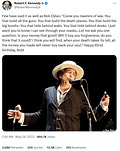Bob Dylan and John Kennedy
Was Dylan's turn in 1964 toward love songs and humor a response to the Kennedy assassination? FFF president Jacob Hornberger examines that question in this video.
I happened to notice this tweet from RFK Jr. this morning, wishing Bob Dylan a happy 82nd birthday, and it reminded me of the below video.
When I watched Martin Scorsese’s Bob Dylan documentary years ago, I wondered if the Kennedy assassination had anything to do with Dylan’s change in lyrical content after 1963. I never found any information on this, until I stumbled upon this video on YouTube. Of course, this is just someone’s opinion, but I find it both fascinating and plausible. We know Dylan didn’t buy the official story, because of his 2020 song, “Murder Most Foul.”
From Wikipedia:
Another Side of Bob Dylan, recorded in a single evening on June 9, 1964, had a lighter mood. The humorous Dylan reemerged on "I Shall Be Free No. 10" and "Motorpsycho Nightmare". "Spanish Harlem Incident" and "To Ramona" are passionate love songs, while "Black Crow Blues" and "I Don't Believe You (She Acts Like We Never Have Met)" suggest the rock and roll soon to dominate Dylan's music. "It Ain't Me Babe", on the surface a song about spurned love, has been described as a rejection of the role of political spokesman thrust upon him. His newest direction was signaled by two lengthy songs: the impressionistic "Chimes of Freedom", which sets social commentary against a metaphorical landscape in a style characterized by Allen Ginsberg as "chains of flashing images,"and "My Back Pages", which attacks the simplistic and arch seriousness of his own earlier topical songs and seems to predict the backlash he was about to encounter from his former champions as he took a new direction.
Some quotes from the video:
Hornberger, in reference to “Murder Most Foul.”
“There’s no way you can ignore Bob Dylan, especially when he comes out with the longest song of his career… dealing with the Kennedy assassination, he put them all in a box… Dylan forced the mainstream media to re-visit the Kennedy assassination.”
He goes on:
“Dylan’s genius was not just focusing in on the murderer. His genius was understanding that this was part of an apperatus, a structure, a governmental structure. And that if we are going to really accomplish anything, we have to look at that structure. That’s what no one else was willing to do.”
Hornberger then quotes from an undisclosed documentary he was watching on Amazon Prime:
Moderator:
“The increasing desire for political and social change that Dylan articulated on the album [he’s talking about The Times They are a-Changing] and which resonated particularly among the later generation was, in part, a result of a new optimism in America. Since Kennedy took office, the country had entered a period of unprecidented economic growth. And although the threat of nuclear war with the Soviet Union loomed large during this period, the young president seemed to represent a new era of peace, both domestically and internationally. This optimism was shattered however, on November the 22nd, 1963.”
Nigel Williamson:
“I think the assassination of JFK scared the shit out of Dylan… That they could gun down in broad daylight - they, whoever they are - the President of the United States, it must have been running through his mind. ‘I’m being called the voice of a generation. I’m being put up there as a spokesman. I’m singing all these radical songs. I’m attacking the whole racist infrastructure of American society. If they can shoot the president in broad daylight, what are they gonna do to me one dark night when I step out of a stage door of a club, where I’ve just sang these these songs that were gonna drive them absolutely mad, into some dark alley?’ He certainly started contemplating where all this just might end up. And it’s at this point, I think, you can trace the beginnings of a more elusive Dylan. Someone who is going to protect himself. There is a real fear there that plays over into both the songs and the way he conducts and bares himself. And, in fact, the outcome of that is that he moves on in a whole new level of creativity and expression, and so it’s enormously positive.”
The rest of the video dissects the lyrics of “Murder Most Foul”. Click below for the video.



